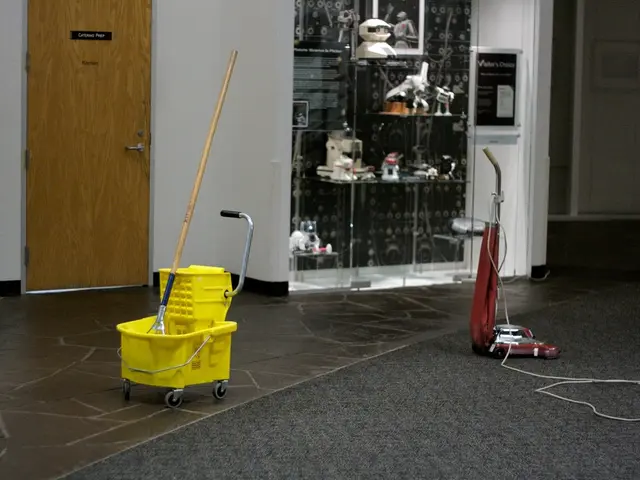Local Cargo Bikes in Scotland: Obstacles to a Domestic Logistics Revolution
In Scotland, the use of cargo bikes as a sustainable and efficient alternative to traditional freight vehicles is gaining traction. However, several barriers have been identified that hinder their widespread adoption. A recent study by our website has highlighted these challenges faced by both commercial and private users in Scotland.
The study categorised these barriers into five themes: cost and funding, infrastructure, training and awareness, storage and security, and insurance and maintenance. To overcome these challenges, key solutions focus on policy support, infrastructure development, and cultural change.
Policy and funding support are essential to encourage the use of cargo bikes. Local transport strategies, such as the Renfrewshire Council’s Local Transport Strategy, explicitly support sustainable freight solutions including cargo bikes, encouraging their use to serve key service centers. Government backing through grants or subsidies similar to electric vehicle incentives could help lower initial costs and encourage adoption.
Infrastructure improvements are crucial to increase cargo bike usage by addressing safety concerns and improving convenience. Safe and dedicated cycling infrastructure, including expanded bike lanes, protected cycling paths, and cargo bike parking hubs, can reduce conflicts with motor vehicles and pedestrians. Infrastructure upgrades for cycle paths can also accommodate cargo bikes and include charging stations for e-cargo bikes.
Awareness and education play a vital role in tackling road-sharing conflicts and bias between motorists and cyclists. Educational campaigns and possibly experiential programs can foster mutual respect and safer road environments. Urban planning adjustments, such as integrating cargo bikes as part of city logistics—especially for last-mile deliveries—in low-emission zones, can improve traffic flow and reduce carbon emissions.
Cultural acceptance is critical in encouraging a shift to view cargo bikes as efficient and practical delivery tools. Promoting success stories, business case studies, and incorporating cargo bike use in public and private freight policies supports this shift.
However, challenges remain. Most bike lanes in Scotland aren't designed with cargo bikes in mind, forcing riders to mix with road traffic. Secure parking bays and bike hangers can be introduced in residential and commercial areas for improved storage of cargo bikes. Finding mechanics capable of servicing cargo bikes adds another complication in maintaining an operational fleet of commercial vehicles.
Despite these challenges, cargo bikes have the potential to re-imagine the urban freight sector, play a large role in our journey to net-zero, and make where we live safer, cleaner, and more people-friendly. As they gain popularity in Scotland, appearing in urban and rural areas, a supportive ecosystem needs to be built for their widespread use. This includes addressing the challenges faced by early adopters and implementing the identified solutions.
Uptake of cargo bikes by businesses and the public remains slow in Scotland. Awareness campaigns can promote their use as viable alternatives to cars and vans for small businesses and organisations. Support networks can be created where businesses can exchange information about reliable insurers or mechanics for cargo bikes.
Insuring a cargo bike as a commercial vehicle is difficult and costly due to a lack of choice in providers. Proper training is required for cargo bike usage but is hard to come by in all regions. Storage solutions for cargo bikes are scarce, especially in urban areas.
Emissions from light goods vehicles, such as vans, have increased in Scotland by up to 25% recently. The transport sector in Scotland aims to cut carbon emissions significantly. Wider adoption of cargo bikes could improve driver attitudes towards larger cycles on the road, lead to better insurance offers, and drive down costs in the second-hand market.
In conclusion, combining policy incentives, dedicated infrastructure, education, and cultural change forms the core approach to overcoming the barriers to widespread cargo bike use in Scotland. Comprehensive UK-wide support and targeted local initiatives remain crucial given the competing demands on urban roads and evolving transport policies.
- The renewable-energy industry should consider financing sustainable freight solutions such as cargo bikes, aiding the energy sector's transition to more efficient and eco-friendly transportation.
- Implementing lifestyle changes can involve investing in renewable energy alternatives like cargo bikes, which is a part of wealth-management strategies focused on sustainable living.
- Home-and-garden businesses could embrace the use of cargo bikes for reduced carbon footprint, aiding in their growth and success in the housing market.
- Businesses, from small enterprises to multinational corporations, must consider energy conservation by adopting renewable energy solutions like cargo bikes in their day-to-day operations.
- Financial institutions should support the growth of the renewable-energy sector by offering loans or lines of credit for purchasing electric vehicles such as cargo bikes or requesting businesses to prioritize clean vehicles for delivery and transport.
- Innovative technology in cargo bikes, including e-cargo bikes, can revolutionize the transportation sector, making cities more people-friendly and sustainable.
- As consumers become more environmentally conscious, they may decide to invest in electric vehicles and sustainable transportation methods like cargo bikes, making career-development opportunities available in the renewable-energy industry.
- Integrating education and self-development in schools and universities can help students gain skills and knowledge about the benefits of custom bike maintenance and the importance of maintaining electric vehicles, such as cargo bikes.
- With the rise of remote work and online learning, individuals may decide to invest in electric vehicles like cargo bikes, making their personal and professional transportation more sustainable and eco-friendly.
- Job searchers might explore career opportunities focusing on the renewable-energy sector, including cargo bikes, to contribute positively to the environment while pursuing personal-growth objectives.
- Learning and skill development in renewable-energy technologies, such as electric vehicles and cargo bikes, can play a role in lifelong learning and personal-finance management, leading to an increased sense of productivity and financial stability.
- Sports enthusiasts and auto-racing fans can support the growth of sustainable transportation methods like cargo bikes by attending events promoting electric vehicles and eco-friendly racing series, such as e-Grand Prix or e-Racing.
- Fostering mindfulness towards the environment and personal well-being can lead individuals to prioritize sustainable transportation options like cargo bikes when making decisions about their lifestyle, career, and personal finances.
- Car maintenance workshops and training centers can offer specialized courses in electric vehicle repair and maintenance, meeting the demands of the growing number of cargo bike owners and filling a gap in the available services for such vehicles.
- Government subsidies for renewable energy initiatives can help lower the costs of energy-saving technologies like cargo bikes and encourage their widespread adoption, improving the overall health and productivity of cities and communities.
- Diversifying transportation options within and across industries can lead to significant advancements in productivity, job creation, and economic growth, as demonstrated by the increasing popularity of electric cars and buses.
- Sustainable living, including adopting eco-friendly transportation methods like cargo bikes, has far-reaching benefits that extend beyond personal finance and into ethical and social realms, such as promoting peaceful, water-saving sports like racing within sustainable environments.




